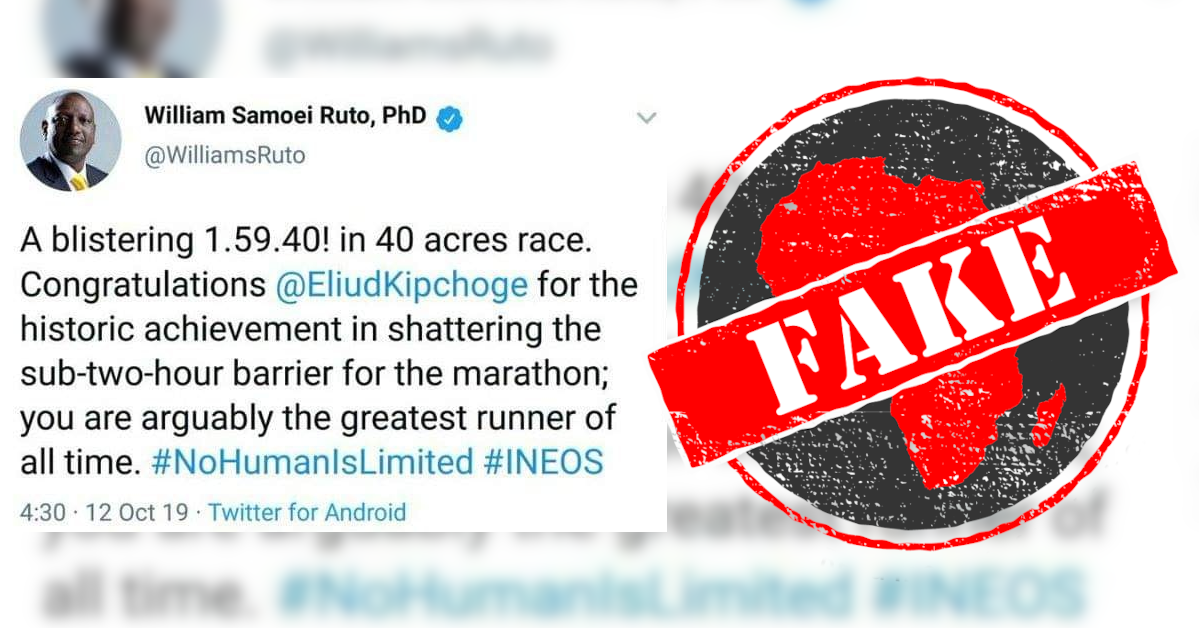On 12 October 2019, in the Austrian capital of Vienna, Kenyan athlete Eliud Kipchoge became the first person to run a marathon in under two hours.
And as congratulatory messages poured in, a screenshot of what seemed to be a tweet from Kenyan deputy president William Ruto was shared on Facebook.
The graphic’s text reads: “A blistering 1.59.40! in 40 acres race. Congratulations @EliudKipchoge for the historic achievement in shattering the sub-two-hour barrier for the marathon; you are arguably the greatest runner of all time. #NoHumanIsLimited #INEOS159.”
The user who posted it added: “40 acres...of lands?”

In 2013 the Kenyan high court ordered Ruto to surrender a farm and pay compensation to a farmer who accused the politician of grabbing the land five years before.
And in early 2019 Ruto reportedly admitted that his upmarket Nairobi hotel was built on land illegally acquired by the previous owner. It’s actually public land belonging to the Kenya Civil Aviation Authority.
Ruto’s opponents have often suggested that he is obsessed with seizing as much land as possible. Kenyans joke that when Ruto appears to be reading the bible, he is actually looking at maps.
The Facebook post seems to make a similar connection.
The deputy president did take to Facebook and Twitter to congratulate Kipchoge after the record marathon. But the messages did not include the phrase “40 acres race”.
Ruto’s actual tweet said: “A blistering 1.59.40! Congratulations @EliudKipchoge for the historic achievement in shattering the sub-two-hour barrier for the marathon; you are arguably the greatest runner of all time. #NoHumanIsLimited #INEOS159.”
The screenshot on Facebook has been photoshopped to add “40 acres race”. – Dancan Bwire
And as congratulatory messages poured in, a screenshot of what seemed to be a tweet from Kenyan deputy president William Ruto was shared on Facebook.
The graphic’s text reads: “A blistering 1.59.40! in 40 acres race. Congratulations @EliudKipchoge for the historic achievement in shattering the sub-two-hour barrier for the marathon; you are arguably the greatest runner of all time. #NoHumanIsLimited #INEOS159.”
The user who posted it added: “40 acres...of lands?”

Ruto’s reputation on land
In 2013 the Kenyan high court ordered Ruto to surrender a farm and pay compensation to a farmer who accused the politician of grabbing the land five years before.
And in early 2019 Ruto reportedly admitted that his upmarket Nairobi hotel was built on land illegally acquired by the previous owner. It’s actually public land belonging to the Kenya Civil Aviation Authority.
Ruto’s opponents have often suggested that he is obsessed with seizing as much land as possible. Kenyans joke that when Ruto appears to be reading the bible, he is actually looking at maps.
The Facebook post seems to make a similar connection.
‘40 acres race’ not in original
The deputy president did take to Facebook and Twitter to congratulate Kipchoge after the record marathon. But the messages did not include the phrase “40 acres race”.
Ruto’s actual tweet said: “A blistering 1.59.40! Congratulations @EliudKipchoge for the historic achievement in shattering the sub-two-hour barrier for the marathon; you are arguably the greatest runner of all time. #NoHumanIsLimited #INEOS159.”
The screenshot on Facebook has been photoshopped to add “40 acres race”. – Dancan Bwire
Republish our content for free
For publishers: what to do if your post is rated false
A fact-checker has rated your Facebook or Instagram post as “false”, “altered”, “partly false” or “missing context”. This could have serious consequences. What do you do?
Click on our guide for the steps you should follow.
Publishers guideAfrica Check teams up with Facebook
Africa Check is a partner in Meta's third-party fact-checking programme to help stop the spread of false information on social media.
The content we rate as “false” will be downgraded on Facebook and Instagram. This means fewer people will see it.
You can also help identify false information on Facebook. This guide explains how.


Add new comment